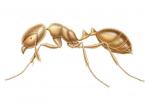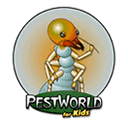Ants
Thief Ant
| Appearance |
|---|
 Golden-yellow;
one of
the smallest ants, 1/16- to
1/8-inch long. Golden-yellow;
one of
the smallest ants, 1/16- to
1/8-inch long. |
| Habitat |
| Thief ants derive their name from their habit of establishing colonies close to other ants to steal their food, and even capture and eat other ants' eggs and larvae. They nest outdoors in soil, trash and rotten wood and tree cavities, and indoors in small crevices, woodwork and masonry. Finding the nests is extremely difficult, so thief ant control is best handled by professionals. Thief ants commonly enter structures during hot, dry weather. |
| Diet |
|
Thief ants prefer high-protein foods, but will feed
on sweets. They eat almost any organic matter, including insects, honeydew,
seeds,
meats, fruit, bread crumbs, oils, nuts, pet foods and dairy
products.
|
| Control |
| Thief ant control can be difficult. They are often mistaken for the slightly larger pharaoh ants; unfortunately, the bait used for pharaoh ant control may not be effective for thief ants. The first step is to locate their nests, by following the trial of foraging workers back from their food source. An experienced ant control professional can tell you which different baits are likely to achieve best results. |
Copyright © 2024 Central Virginia Pest Management Association - Web site designed by BCS



